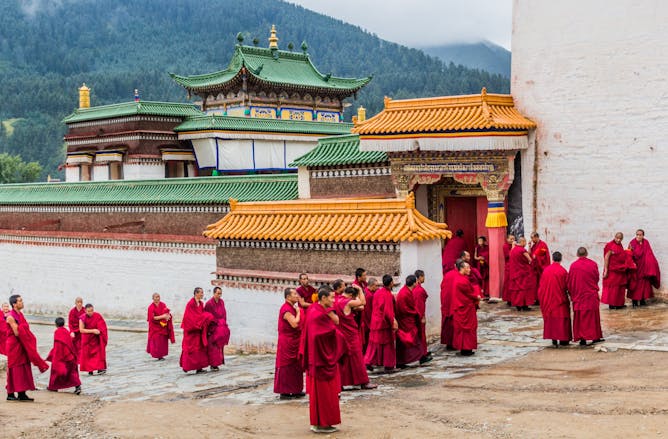|
Regular readers of this newsletter may know that we paused our network podcast, The Conversation Weekly, earlier this year to consider how best to move it forward. But it is back, and you can check out our most recent episodes here. And you’ll notice at the top, that we have a new show running through the channel: Discovery. This is an ongoing mini-series that tells the story of fascinating new research discoveries from around the world. Each episode will feature an interview between one of our hosts, Gemma Ware or Dan Merino, and a researcher who explains the journey they went on to make the discovery. Episodes will be around 20 minutes long in a
semi-scripted format and published every 2-3 weeks on Mondays, as additional content to our full episodes out every Thursday. We hope you enjoy it.
All The Conversation’s audio content can be accessed via the site, or wherever you get your podcasts.
|

Tibetan monks at a monastry in Gansu province in China. New research shows sending a child to a monastery can have surprising evolutionary advantages for a family.
Matyas Rehak/Shutterstock
Gemma Ware, The Conversation
Listen to the first episode of Discovery, a new series available via The Conversation Weekly podcast, telling the stories of fascinating new research discoveries from around the world.
|

Chris LeBoutillier/Unsplash
Andrew King, The University of Melbourne
Our planet is undeniably in crisis and desperately needs COP27 to succeed. Without concrete action, we are condemning today’s children to a harsher future.
|
|
|
-
Bethany Tietjen, Tufts University
That’s the big question at the upcoming UN Climate Change Conference, known as COP27, and it’s controversial. Here are some of the ideas being floated.
|
|

Manal Mohammed, University of Westminster
Two new omicron subvariants, BQ.1 and BQ.1.1 could lead to another COVID surge. Here’s what we know so far.
|
|
|
-
Felipe Tirado, King's College London
Brazil’s presidential handover will take place in January. Observers are hoping it will be peaceful.
-
Donna M Goldstein, University of Colorado Boulder; Kristen Drybread, University of Colorado Boulder
GOP candidates Kari Lake, Herschel Walker and Dr. Mehmet Oz have caught people’s attention for outlandish stunts and false statements that are increasingly accepted in politics.
-
Tolu Olarewaju, Keele University
Serena Williams’s investment in a Nigerian digital company shows why the country’s technology sector is attractive.
-
Ashique KhudaBukhsh, Rochester Institute of Technology
An analysis of hundreds of thousands of interactions on cable news programs shows that women interrupt more often than men – and it may be because they also have to fight for equal airtime.
-
Omowunmi Isafiade, University of the Western Cape
Predictive policing has improved in leaps and bounds and become increasingly automated thanks to big data, data mining and powerful computers.
-
Brianna Le Busque, University of South Australia
Many surfers have seen sharks while surfing in the ocean. Yet, unlike the general public, 60% are not afraid of sharks. It’s a finding that offers an insight into attitudes to shark conservation.
-
Brad Poulos, Toronto Metropolitan University
A third platform for ordering cannabis in Ontario provides little to no benefit to consumers or retailers.
|
|